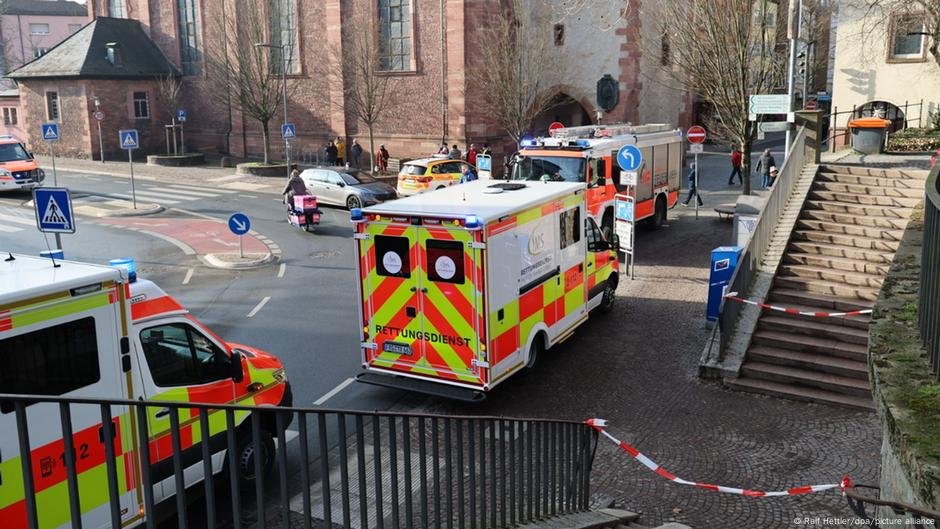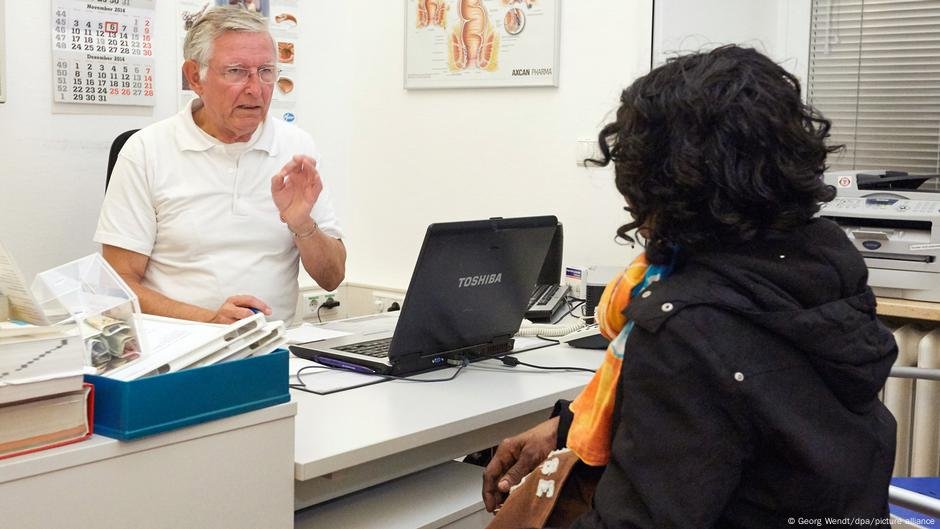A series of deadly attacks in Germany in recent months perpetrated by foreign nationals have raised questions about the mental health state of asylum seekers. While many are wondering whether authorities are doing enough to help people before they resort to committing violent acts, experts warn that most solutions sought in response to violent acts are actually counter-productive and might lead to more violence.
The most recent knife attack in the city of Aschaffenburg resulted in two deaths, including a small child. The perpetrator of the crime was an Afghan national, who had been under psychiatric care in Germany for a while. In December 2024, the suspect in a car ramming attack in Magdeburg was also reported to have had a history of mental health issues.
Most people who seek asylum are likely to have been exposed to traumatic events. In fact, the German Association of Psychosocial Centers for Refugees and Victims of Torture (BAfF) says that 87 percent of all people in Germany who escaped war and persecution are prone to have witnessed some form of trauma either during or even before embarking on their migration journeys.
About a third of those traumatized individuals, says BAfF, are believed to suffer from depression or PTSD (post-traumatic stress disorder) as a direct result of what they had to go through, including human rights violations, active persecution, sexual violence, torture, witnessing murders and deaths and many other forms of trauma.

However, the real number of refugees and asylum seekers suffering trauma could actually be much higher, as seeking help often proves difficult or even futile for many, who need it the most.
A slow onboarding process
For instance, it can take up to six months in Germany for asylum seekers to successfully be placed with a therapist or a similar mental health professional.
Structural problems in the overall healthcare system and specifically in the unique subset of health services that are accessible to asylum seekers are a main reason for these lengthy wait periods:
A BAfF report from last year explains that during the first three years upon arrival, refugees and asylum seekers in Germany can only make use of emergency healthcare services without going through frustrating bureaucratic processes first, which automatically are associated with months-long waits.
During this time, some people give up the hope of having their problems addressed and treated, and some even let go of their place in line because of that.
Read AlsoGermany: One million asylum seekers with a mental illness – media report
Not enough done to assess risks
Frank Neuner, a professor for clinical psychology at the University of Bielefeld cited by the German public broadcaster WDR, said that in the general population alone, up to one in four people might be in need of psychological help, adding that it should not come as a surprise if the share of traumatized asylum seekers with mental health issues was higher than that.
With refugees, he believes that much more needs to be done to "assess in time whether someone might pose any kind of imminent danger to themselves or to others."

BAfF agrees with this assessment, saying that Germany lacks appropriate healthcare provisions for asylum seekers in general, not only when it comes to the threat of harming others but first and foremost in the context of harming themselves.
Suicide rates and suicidal ideations among refugees, asylum seekers and migrants continue to pose a greater risk than any indications of homicidal behavior.
Read AlsoUK: 270 migrants have died since 2015 while awaiting asylum decisions
Limited data available to forecast trends
Ultimately, it is difficult to fully quantify how many people may suffer from the consequence of trauma and to what extent, since German authorities do not keep statistics or other collective records on health issues related to migration.
Most of the information on the subject is anecdotal or limited to observations made at individual facilities. One social worker told WDR that about a quarter of all the asylum seekers she dealt with showed signs of serious psychological distress.
The director general of a first arrival center in the federal state of Rhineland-Palatinate meanwhile told the SWR public broadcaster that he believes that a third of all new arrivals show signs of mental health issues, adding however, that only 5 percent of that group might qualify as severely disturbed.
Read AlsoSafe but not sound: Syrian refugees on a hard road to mental health
Identifying worrying behavior
Victoria Engelmann, a forensic psychiatrist in charge of assessing criminals, told the Frankfurter Rundschau newspaper that the general public and politicians alike — and even some experts — generally fail to understand the overall mental condition of people who commit such violent acts.
Whether they may be refugees or not, this lack of insight into the minds of potentially violent individuals also hinders them from being identified in the first place, she explains.
Engelmann highlighted that for a long time before committing violent crimes, highly disturbed individuals already tend to display worrying kinds of behavior, including "increased irritability levels or outbursts of anger, mental hyperexcitability, emotional numbness and dissociative states in which those affected lose the ability to integrate their memory, identity and consciousness."

She believes that it doesn't take highly trained medical experts to flag people who display such erratic patterns of behavior and thus help curb violent crime.
"Those affected tend to feel overly impacted by the actions of others and feel compelled to 'fight back' or 'attack first,'" Engelmann explained.
From the information that is publicly available on the Aschaffenburg case, Engelmann surmised that the suspect "most likely" had been suffering from schizophrenia or another type of psychosis -- potentially one induced by the use of drugs -- which she thinks likely caused the perpetrator to completely lose touch with reality, "unable to criticize, judge or, if necessary, control themselves."
She also stressed, however, that "statistically it is extremely rare" for someone in such a dissociated state to commit any act of violence but that nonetheless they should be referred to professionals who can help as a matter of urgency.
Limited funds available to intervene sufficiently
However with asylum seekers, such referrals can also prove to be hurdles in and of themselves. There is also a dire shortage of staff in Germany to help guide refugees through their trauma as well as a lack of public funds to finance therapeutic interventions.
Some therapeutic facilities for asylum seekers have even had to close down in recent years because of funding issues.
Another key problem is the language barrier between asylum seekers and German mental healthcare practitioners. Migrants' rights advocates say that refugees should have a right to an interpreter for therapy sessions and psychiatric assessments.
Those who have the rare fortune to be assigned an interpreter usually get an unpaid volunteer, who might not be well versed in medical and mental health vocabulary, BAfF says.
Calls for local authorities to hire and use paid translators in such cases are only considered in rare and exceptional cases.

Meanwhile, there are also similar problems at the other end of the mental health debate: Working as a psychotherapist with people who have been granted protection in Germany is generally not an attractive career choice for many health practitioners:
Local and regional government structures are typically only allowed to issue one-year contracts for the mental health professionals they recruit; but many therapists, counsellors and other practitioners in the field demand more long-term security in their employment contracts.
At first arrival centers, there's also a lack of proper psychological care for refugees, with employees at a number of these facilities telling WDR that some people don't get the help they notably require for years, also chiefly due to underfunding.
Read AlsoGermany: Traumatized migrants could lose access to 'essential' psychosocial support
Wrong response from politicians and society
Meanwhile, politicians appear to react to violent attacks like those in Aschaffenburg and Magdeburg by further limiting asylum and immigration laws.
Experts believe that this only mounts more pressure on an already desperate set of people, creating a sense of uncertainty and instability which might push certain vulnerable individuals into deeper despair and inspire some to physically lash out at others with violence.
Psychologist David Schiefer from the German Center for Integration and Migration Research (DeZIM) told the epd news agency that there are other measures that can be taken to lower the risk of people resorting to violent acts, highlighting that focusing on prevention is the best approach.
"You can say that to a certain degree the problem of psychological disorders (among refugees) is created by ourselves," he said, referring to DeZIM research that shows that only about 3 percent of all asylum seekers who might be in need of mental health services actually receive help in the end.
"We need far more healthcare services for refugees, but also for the general population, in order to avoid such crimes from occurring in the first place."
Read AlsoGermany: Aschaffenburg attack prompts political blame game
